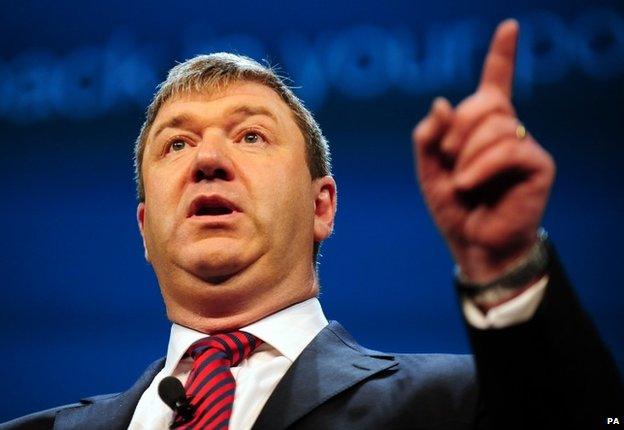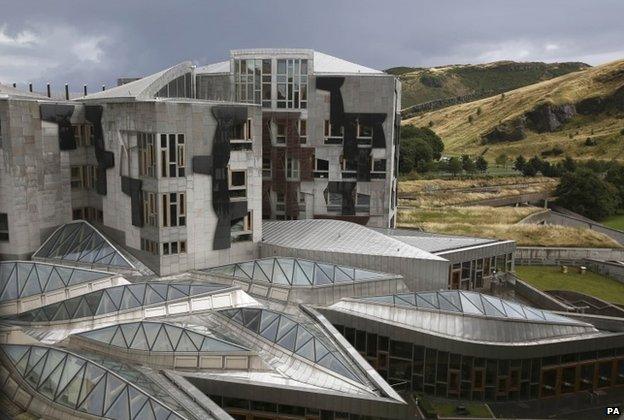Scottish devolution 'command paper' published
- Published

Scottish Secretary Alistair Carmichael said UK ministers were committed to delivering more powers for Scotland
The UK government has formally published plans on giving more powers to the Scottish Parliament, following the vote against independence.
The paper sets out plans from the pro-Union parties, external, including proposals for more financial responsibility.
Scottish Secretary Alistair Carmichael said the "No" vote in September's referendum showed people wanted a strong, devolved parliament.
The SNP said the proposals of its opponents were inadequate.
The five Scottish Parliament parties have already submitted their proposals for further devolution to the Smith Commission, which was set up by Prime Minister David Cameron in the wake of Scottish voters rejecting independence by 55% to 45%.
The commission aims to agree a way forward by the end of November, before the UK government puts forward draft legislative proposals in January 2015, with the bill to be brought forward after the 2015 UK election.
'Demand is there'
Mr Carmichael, who outlined the details of the Westminster government's "command paper" in parliament, said: "The referendum result made clear the majority of people in Scotland want to see a strong devolved parliament as part of the UK.
"We pledged further devolution and we will deliver on that promise. Today's command paper sets out the detail of the political positions from the parties."
In a statement to MPs Mr Carmichael insisted the timetable would not slip and legislative proposals would be in place by Burns Night - 25 January.
He added: "We should all move on from being part of being the 55% or the 45% to working for 100% of the people in Scotland.
"The timetable is demanding but that is because the demand is there in Scotland... it is a demand we shall meet."
Although the paper does not contain a great deal of extra detail, UK ministers see it as a statement of their intent to move forward with devolving further powers to the Scottish Parliament.
'Damp squib'
Deputy First Minister Nicola Sturgeon dismissed the publication as "a bit of a cut-and-paste job" containing no new information.
"The SNP are going into this in good faith wanting to have a meaningful discussion that will lead to the substantial new powers that were offered," she told the BBC.
"What the other parties are offering right now is inadequate and they've got to go beyond where they are if that discussion is going to result in what people in Scotland want - which is powers that will give us the ability in Scotland to grow the economy and create jobs and tackle inequality."

The Scottish Parliament parties have submitted their proposals to give more powers to Holyrood
Scottish Green co-leader Patrick Harvie described the command paper as a "damp squib", adding: "It simply repackages what the three UK parties put forward in the spring, since when public debate has moved on considerably and public expectations have been built up."
Shadow Scottish secretary Margaret Curran said Labour backed the process to deliver more devolved powers, telling MPs: "Following the referendum, we can say with confidence that devolution is the settled will of the Scottish people, and that we shall have a stronger Scottish Parliament."
The Scottish government called for full control over fiscal and tax policy from Westminster in its submission to the Smith Commission, as well as powers over other areas including welfare, energy and broadcasting.
The pro-independence Greens also said the Scottish Parliament should be given wide economic powers and control over most of the welfare system.
Labour said it was seeking powers which would allow the Scottish government to raise 40% of its own budget and increase the top rate of tax, as well as control over housing benefit and attendance allowance.
The Conservatives said Holyrood must be responsible for setting the rates and bands of personal income tax as well as a share of VAT, while the Liberal Democrats said Scotland must raise most of the money it spends.
Commons debate
Publication of the command paper came ahead of a Commons debate on Tuesday, in which Some English MPs are expected to call for more devolution for England, and for Scottish MPs to be prevented from voting on English-only matters.
In Parliament on Monday, Conservative Liam Fox - a Scot who represents an English Constituency - said more devolution to Holyrood should be accompanied by a "rebalancing" of the constitutional settlement, including English votes for English laws.
Crispin Blunt, Tory MP for the Surrey constituency of Reigate, said that the Scottish Secretary "has no mandate, from me or my constituents, to devolve further powers to Scotland whilst he expects my constituents to bankroll it and fails to address the issue of English laws for English votes".
Mr Carmichael said the process should "open the door" for change across the UK, but insisted the UK government would not delay the timetable for Scottish devolution.
Former prime minister and Scottish MP Gordon Brown will also lead a UK Parliament debate on the issue later in the week, in which he will say there must be no delay on more powers for Scotland.
On Sunday, Mr Brown accused Mr Cameron of being "unstatesmanlike" for suggesting Scottish MPs should be denied full voting rights at Westminster on issues which affected only England and Wales.
Mr Brown said this would turn Scottish MPs into "second class citizens at Westminster".